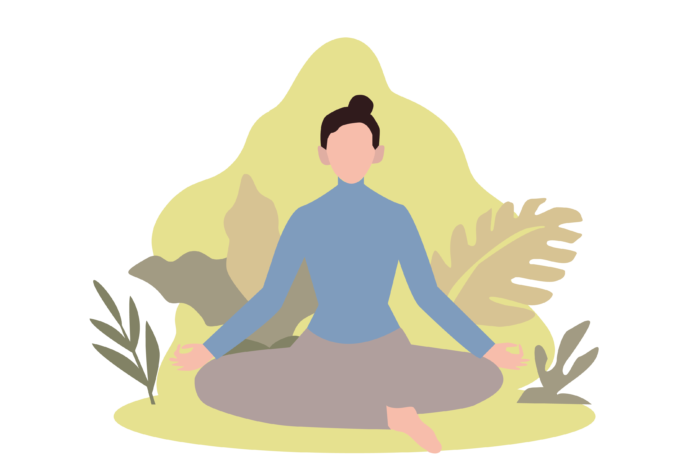Meditation not only brightens your day, but it also has a variety of positive health effects
By YASMEEN O’BRIEN — yjobrien@ucdavis.edu
The first time someone recommended meditation to me, I scoffed. I thought meditation was only for enlightened monks who were willing to sit in silence for hours. I also didn’t think I could do it; I didn’t think I could clear my mind like that. But when I tried it for the first time, I realized how wrong I was.
After getting comfortable with meditation, I found mindfulness meditation worked the best for me, where you focus on being intensely aware of what you’re sensing and feeling in the moment. The key is to notice your feelings without shifting your focus to interpreting or judging them. Practicing mindfulness also involves breathing methods and guided visualizations, which help relax the body and mind and reduce stress.
Mindfulness meditations can be as long or as short as you would like — for example, maybe you just pause for a few minutes during your busy day to sit outside, close your eyes and focus on your breathing and the bird sounds around you. I have found that even these short moments make me feel less stressed, more centered and ready to tackle the rest of the day.
Guided meditations are also helpful for beginners because someone describes where to put your focus. These guided meditations got me to a place where I can now lead myself in a practice without help, but I still like to use them. There are many videos on YouTube for different kinds of meditations and different topics, like ones that help you focus on being present, letting go, gratitude, overcoming overthinking and many others.
I encourage you to look into all of the options available online because there will likely be one that speaks to you. I have found that meditation allows me to approach daily life with more kindness and grace.
And you don’t have to just take it from me. Studies done by the National Institutes of Health found that mindfulness practices can help people manage stress, cope better with serious illness and reduce anxiety and depression. They also found that many people who practice mindfulness reported an increased ability to relax, a greater enthusiasm for life and improved self-esteem. I know it may be hard to believe, but mindfulness meditation can work wonders.
My favorite kind of mindfulness meditation is loving-kindness mindfulness, which is exactly what it sounds like. It focuses on generating feelings of love and kindness toward oneself and others and is sometimes called practicing “universal friendliness” because the affection you’re putting out into the world is without any desire or expectation of return. This practice has helped teach me to cultivate compassion, kindness and warmth toward myself and others.
Meditation is something I recommend to all my loved ones and something I wholeheartedly believe everyone should try. So practice meditation if you’re struggling or feeling hopeless about the world, but also if you’re feeling grateful or inspired. It helps me find peace, and I hope it will help you too.
Written by: Yasmeen O’Brien — yjobrien@ucdavis.edu
Disclaimer: The views and opinions expressed by individual columnists belong to the columnists alone and do not necessarily indicate the views and opinions held by The California Aggie.




